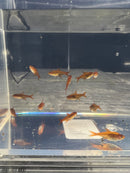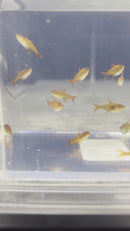Description
The Ember Tetra, scientifically known as Hyphessobrycon amandae, is a small and brilliantly colored freshwater fish species originating from the clear, slow-moving waters of Brazil's Araguaia River basin. These petite tetras are highly prized by aquarists for their vibrant and fiery appearance, making them a sought-after choice for both beginner and experienced fish keepers.
Appearance: Ember Tetras are named after their striking and fiery coloration. They have a compact and streamlined body, typically growing to about 0.8 to 1 inch (2 to 2.5 cm) in length when fully mature. What distinguishes them is their bright orange to red-orange body color, which gives them the appearance of a glowing ember. This vivid coloration extends from the tip of their nose to the base of their caudal fin. Their eyes often have a silvery or metallic sheen, adding to their visual appeal.
Behavior and Personality: Despite their small size, Ember Tetras are known for their lively and active behavior. They are often seen swimming near the middle and lower levels of the aquarium, creating a vibrant display of color and movement. These tetras are generally peaceful and make excellent community fish, getting along well with other small, non-aggressive species.
Habitat and Care: To provide an ideal habitat for Ember Tetras, set up an aquarium with a minimum capacity of 10 to 20 gallons, ensuring it is well-planted with open swimming spaces. These tetras appreciate the presence of floating plants and driftwood for shade and hiding spots. Maintain a stable water temperature between 74°F to 82°F (23°C to 28°C) and a slightly acidic to neutral pH level (around 6.0 to 7.0).
Diet: Ember Tetras are omnivorous and have a versatile diet. They accept high-quality flake foods and pellets designed for small tropical fish. To enhance their coloration and overall health, provide them with live or frozen foods such as brine shrimp, daphnia, and bloodworms. Offering a diverse diet is beneficial for their nutrition.
Compatibility: These tetras are known for their peaceful nature and can coexist with a variety of other non-aggressive fish species that share similar water parameters. They are often kept alongside other small community fish like other tetras, rasboras, and small catfish. Due to their small size, it's crucial to avoid housing them with larger or aggressive tankmates that may view them as prey.
Payment & Security
Your payment information is processed securely. We do not store credit card details nor have access to your credit card information.











